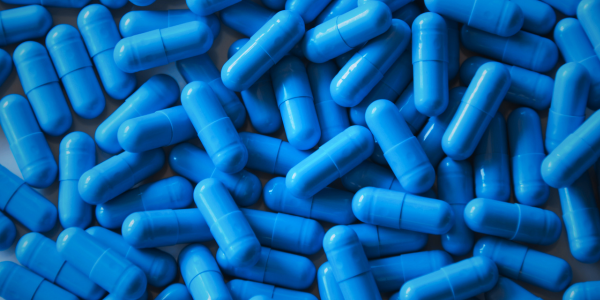
What is Free Testosterone?

Testosterone is an anabolic sex hormone.
In men, Testosterone is responsible for developing secondary sex characteristics, supporting sex drive and sexual function, triggering the creation of sperm (spermatogenesis) and more.
Women’s bodies also produce Testosterone in smaller amounts than men. In women, Testosterone is responsible for supporting sex drive and body composition, maintaining bone mass, supporting reproductive health, and other functions.
Testosterone is found in two main forms in the body: bound and free. If Testosterone is bound, it’s connected to a protein. If Testosterone is free, that means it’s not attached to any other substance.
We’ll go into more detail about what Free Testosterone is and why it’s important for bodily function.
What is Free Testosterone?
Free Testosterone is unattached Testosterone in the bloodstream. Testosterone often bonds to proteins like albumin and Sex Hormone Binding Globulin (SHBG). Once bound to a protein, Testosterone can no longer be utilized as effectively. That’s why Free Testosterone is an important measurement in overall Testosterone levels.
Free Testosterone performs most of the functions we associate with Testosterone. Because it’s unbound, it can interact with any cell or receptor in the body. Free Testosterone makes up about 2% of the total Testosterone within the bloodstream.
Around 80% of the Testosterone in the body is bound to SHBG. A smaller amount is bound to albumin, which is considered a weak bond – meaning it can be broken to be utilized.
The Effects of Free and Bound Testosterone
Now you know the difference between free and bound Testosterone, but how do the different types of Testosterone affect you?
Free Testosterone is the only form that is considered bioactive, meaning it can be utilized. If you have normal Testosterone levels, but most of your Testosterone is bound to SHBG, you can still experience low Testosterone symptoms.
Low T symptoms include:
- Erectile dysfunction and lack of sex drive in men
- Sexual dysfunction and low libido in women
- Fat gain and changes in body composition
- Difficulty building muscle
- Fatigue and insomnia
- Mood swings
- Anxiety and depression
Some men naturally produce more SHBG and therefore have less free Testosterone.

What is Total Testosterone?
Total Testosterone is the combined amount of bound and unbound Testosterone in the bloodstream. Blood tests should check Total Testosterone and Free Testosterone to understand your overall Testosterone levels. You may find that your Total Testosterone levels are in range, but your free Testosterone levels are below average.
Many traditional doctors don’t look at these numbers closely enough and miss signs of low Testosterone. Defy Medical’s Comprehensive HRT panel includes Free and Total Testosterone to get an accurate understanding of your hormones.
We also measure SHBG to determine whether elevated levels are contributing to your low T symptoms. Our panel measures other hormones like Estrogen and DHEA (Dehydroepiandrosterone) as well for a complete view of your hormone health.
What is the Function of SHBG?
Although Sex Hormone Binding Globulin can cause issues with Testosterone levels, it plays an important role in the body. SHBG regulates hormone levels and helps distribute hormones throughout the body.
In addition to Testosterone, SHBG also attaches to DHEA and Estradiol (the most common form of Estrogen). SHBG is produced by the liver and is regulated by factors like sex and thyroid hormones, insulin levels, and diet.
Testosterone Replacement Therapy for Low T
If you test your Free and Total Testosterone along with other health markers and find that you have Testosterone deficiency, you can consider Testosterone Replacement Therapy (TRT).
TRT is an ongoing therapy that replenishes your Testosterone levels to relieve low T symptoms. Testosterone is available in many forms, also called delivery systems.
Testosterone delivery systems include:
- Testosterone injections
- Topical Testosterone
- Implantable Testosterone Pellets
- Nasal Testosterone (Supplemental)
- Combination therapies

TRT with Defy Medical
Defy Medical offers Testosterone Replacement Therapy nationally via convenient telemedicine.
Our providers are experts in the field of Men’s and Women’s Health and bring that expertise to you with extended consultations and individualized care. Patients with Defy Medical can also order their medications through our online Patient Portal for a simple treatment process.
Ready to learn more?
Get Started

